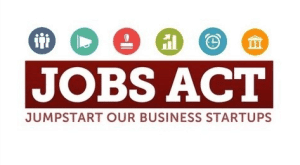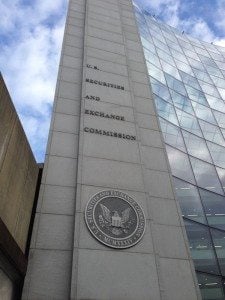When I think of bad actors, I think of Keanu Reeves and William Shatner. When the Securities and Exchange Commission mentions bad actors, they are talking about people they want to prevent from using equity crowdfunding in order to protect investors from fraud.
 Before the JOBS Act came into existence, the Dodd–Frank Wall Street Reform and Consumer Protection Act (most of us simply call it “Dodd-Frank” or “That Law To Protect People From The Next Bernie Madoff”) was created in response to the ongoing financial crisis and sought to prevent another crisis from happening by addressing issues within the existing financial system. Dodd-Frank was signed into law in 2010 and addressed some well-publicized issues with Wall Street and the financial regulatory industry. It specifically required the SEC to adopt rules that would disqualify securities offerings involving certain “felons and other bad actors” from raising money through private placement offerings.
Before the JOBS Act came into existence, the Dodd–Frank Wall Street Reform and Consumer Protection Act (most of us simply call it “Dodd-Frank” or “That Law To Protect People From The Next Bernie Madoff”) was created in response to the ongoing financial crisis and sought to prevent another crisis from happening by addressing issues within the existing financial system. Dodd-Frank was signed into law in 2010 and addressed some well-publicized issues with Wall Street and the financial regulatory industry. It specifically required the SEC to adopt rules that would disqualify securities offerings involving certain “felons and other bad actors” from raising money through private placement offerings.
This meant that anyone who wanted to avoid registration with the SEC by using the Regulation D exception to raise money for a new business needed to be sure they had no “bad actors” on their team. You have a convicted felon as your president? No dice. Your CEO was in trouble with the SEC on a prior offering? Not going to happen. You have a majority shareholder whose brokers’ license was revoked? Time to find a new shareholder.
How does this relate to equity crowdfunding under the JOBS Act once the SEC rules become final?
When it comes to bad actors, the proposed JOBS Act rules are just as burdensome as those that apply to Regulation D offerings. Add this to the other major due diligence and compliance issues for every company that wants to raise money using crowdfunding under the JOBS Act. Whether you want to raise $10,000 or $1,000,000 with equity crowdfunding, you will be held to practically the same standard as a company raising $40 million under Regulation D. Just like the bigger offerings, in order to raise funds with equity crowdfunding, you must perform a background and securities regulatory check on every director, officer, general partner or managing member of your company, any promoter, anyone who will be paid to help promote or market your offering and any owner of 20% or more of your voting shares.
For those concerned about potential fraud in the equity crowdfunding world, these bad actor rules provide a comfort zone. Eliminating known bad actors will curb fraud. It may also lessen the need for investors to thoroughly research the backgrounds of those running the companies they want to invest in. These are all good things for equity crowdfunding as a whole.
 But the tradeoff is another expensive undertaking for a startup company using equity crowdfunding to raise the $100,000 that banks and angel investors are no longer interested in funding. Assume your startup has a board of six directors, a president, vice president, treasurer and secretary, and two owners that hold 25% of the company voting stock each. That gives you 12 people who have to undergo background checks. Unfortunately, these are not simple background checks that can be done with a few simple Google searches. To comply with the bad actor rules, every one of these 12 people has to be checked for eight extensive categories of bad acts. You can see all eight categories at this link: http://www.sec.gov/rules/proposed/2013/33-9470.pdf. No need to read all 585 pages. Just skip ahead to page 519 and read Section 227.503. Get ready to read a lot of legalese, or as I call it, the online version of Ambien.
But the tradeoff is another expensive undertaking for a startup company using equity crowdfunding to raise the $100,000 that banks and angel investors are no longer interested in funding. Assume your startup has a board of six directors, a president, vice president, treasurer and secretary, and two owners that hold 25% of the company voting stock each. That gives you 12 people who have to undergo background checks. Unfortunately, these are not simple background checks that can be done with a few simple Google searches. To comply with the bad actor rules, every one of these 12 people has to be checked for eight extensive categories of bad acts. You can see all eight categories at this link: http://www.sec.gov/rules/proposed/2013/33-9470.pdf. No need to read all 585 pages. Just skip ahead to page 519 and read Section 227.503. Get ready to read a lot of legalese, or as I call it, the online version of Ambien.
For those who don’t enjoy reading securities law, let me take you through three of the eight categories as examples. Here are some things that will disqualify people – and by extension, companies – from using equity crowdfunding:
- Convictions within 5 or 10 years (depending on who is being checked) of any felony or misdemeanor involving securities or “arising out of the conduct of the business of an underwriter, broker, dealer, municipal securities dealer, investment adviser or paid solicitor of purchasers of securities.”
Seems like a pretty simple background check, until you talk to people who do background checks. If you want to get nitpicky about it, that last part in quotes would require a private investigator to look into the court records of every county that all 12 of your people have ever lived in. There is no national database that covers every criminal conviction of every person in every county in America. Complying with this provision to provide 100% certainty that your 12 people are “good actors” could cost hundreds, if not thousands, of dollars on this category alone.
- Orders, judgments or decrees of “any court of competent jurisdiction” where an individual is restrained from any conduct “arising out of the conduct of the business of an underwriter, broker, dealer, municipal securities dealer, investment adviser or paid solicitor of purchasers of securities.”
Once again, the intention here is to ferret out the bad guys who ripped off grandma in some “pump and dump” scam. But, if you read this language carefully (as regulators tend to do) this could include any person, in any court anywhere in the world who might have a civil judgment involving securities. For example, this could technically apply to a husband who, in his divorce proceedings, was ordered to not sell stock while the divorce was pending. Imagine the cost involved of doing a county-by-country nationwide search of every civil court database to see if any injunctions or restraining orders exist. Get ready to write another big check.
- A United States Postal Service false representation order, temporary restraining order or preliminary injunction.
 Try searching online to see if someone has a “false representation order” from the post office. I dare you. At the U.S. Postal Service web site, you can see lots of pretty stamps, but no method of searching to see if the Postmaster General went after one of your officers for sending a solicitation in the mail that looked too much like a bill.
Try searching online to see if someone has a “false representation order” from the post office. I dare you. At the U.S. Postal Service web site, you can see lots of pretty stamps, but no method of searching to see if the Postmaster General went after one of your officers for sending a solicitation in the mail that looked too much like a bill.
Don’t get me wrong. It’s good that these regulations aim to keep the public safe from fraud. But, the bottom line is the only way to fully comply with the law and SEC rules and to be able to give investors 100% certainty you don’t have any “bad actors” will price many entrepreneurs out of the market completely. Fortunately, it appears the SEC realized this, so they added this way out for equity crowdfunders. It seems the SEC says you don’t disqualify anyone if:
- Any of the bad acts occurred before the SEC rules actually go into effect or;
- If you can establish that you did not know and, in the exercise of reasonable care, could not have known that any of the bad stuff had happened.
If the bad acts occurred before the date the SEC rules go into effect, you still have to disclose them to potential investors, but you will not be disqualified from keeping the bad actor on your team. Frankly, this seems ridiculous to me. If you find a convicted securities fraud running a startup after spending all the money to do the bad actor check, why is he allowed to stay on just because he stole millions from someone the year before the SEC rules went into effect, and not the day after?
On the second part, good luck convincing a regulatory body investigating you by relying on the “head in the sand” defense. “Yes, Mr. Regulator. I ‘exercised reasonable care’ but didn’t realize my President once was convicted of securities fraud in Nome, Alaska.” I can assure you, that is not going to fly in the “reasonable care” department.
Certainly, companies can take a chance and not perform thorough bad actor background checks in all eight categories under the law. Some companies will do minimal background checks and hope that whatever they miss will falls within the SEC’s exception for “exercising reasonable care” and then cross their fingers and hope for the best. But, history suggests that is not a great idea. Lawsuits for non-disclosure of bad actors against the company, and against those who own and operate the company, will certainly happen. And the regulatory bodies are not going to be happy with a company that goes belly-up and loses $1,000,000 of small investors’ money because a known securities fraudster made it through without a proper background check, then embezzled the hard-earned money of Main Street America that funded the company under the JOBS Act.
The only way to be safe and to assure that your company is compliant with the SEC rules and the JOBS Act will be to spend the money necessary to thoroughly vet for bad actors. And sadly, that is going to be expensive, and price many people out of the equity crowdfunding marketplace.
 Kendall Almerico is a nationally recognized crowdfunding and JOBS Act expert who has appeared in USA Today, Huffington Post, the New York Daily News, Business Insider, Fox Business Network and hundreds of newspaper, blog, radio and television interviews including CNN and The Sean Hannity Show. Almerico is also CEO of ClickStartMe, a crowdfunding site that provides individuals and businesses with an easy-to-use website to raise funds through online crowd funding. Almerico is also the founder of CrowdItForward, a charity-based crowd funding site that performs “Random Acts of Crowdfunding” and raises money for people in need through a 501(c)(3) charitable foundation.
Kendall Almerico is a nationally recognized crowdfunding and JOBS Act expert who has appeared in USA Today, Huffington Post, the New York Daily News, Business Insider, Fox Business Network and hundreds of newspaper, blog, radio and television interviews including CNN and The Sean Hannity Show. Almerico is also CEO of ClickStartMe, a crowdfunding site that provides individuals and businesses with an easy-to-use website to raise funds through online crowd funding. Almerico is also the founder of CrowdItForward, a charity-based crowd funding site that performs “Random Acts of Crowdfunding” and raises money for people in need through a 501(c)(3) charitable foundation.

